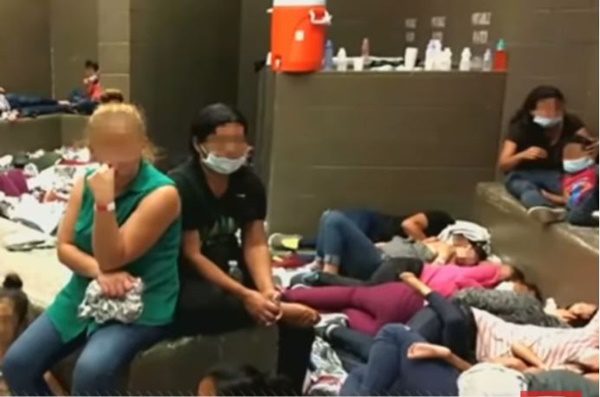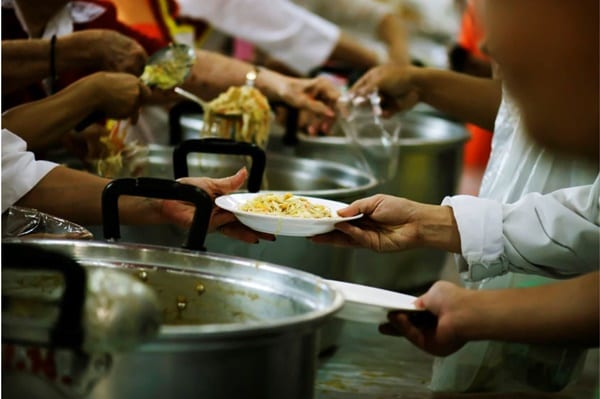What do you think when you hear “Sodom and Gomorrah?” Progressive Christians rightly have long decried the misuse of this story as a clobber text against homosexuality. And yet, the word “sodomy” in our modern language does not refer to the actual sins of Sodom: arrogance, neglect for the poor, and hostility to migrants. Our culture has a long way to go when it comes to understanding the full meaning of this story.
With a humanitarian crisis looming on our Southern border and a crisis of division and dehumanization fracturing our nation, it is vital that we come to understand what it was that truly destroyed the city of Sodom. Spolier: it wasn’t the wrath of God. That truth may be obscured in the Genesis story, for scripture is a journey of humanity’s evolving understanding of God, and humans got the idea of God’s wrath all wrong. But there is much truth in this story as well, for it rightly tells us what moves God to action: a desire to alleviate human suffering.
God’s Expanding Mercy – Or Our Expanding Understanding
When we read the story of Sodom in conjunction with this week’s Gospel highlighting the Lord’s Prayer, we see an evolution of humanity’s understanding of God’s patience and compassion. We see God go from feared to Father, from one who would destroy to one who gives only good. And in the context of the crisis on our Southern border, we see in these stories a road map for what may come if we treat the migrants coming to our border with cruelty… and what may come if we treat them with compassion. The fates of those who cross desert sands and stormy seas to reach our borders are intertwined with our own fate.
In the Hebrew Bible reading, Genesis 18:20 – 32, God rails to Abraham against the sins of Sodom and Gomorrah. Ezekial 16:49 defines these sins thusly: “This was the guilt of your sister Sodom: she and her daughters had pride, excess of food, and prosperous ease, but did not aid the poor and needy.” The plight of the poor stirs God’s passion. That in itself is a mercy, and recognizing God’s concern for the vulnerable is a tremendous step forward from an understanding of the world that sees God at work in and for the powerful. Nevertheless, ancient understandings of God’s power are intertwined with wrath and fiery judgment, and in this story Abraham pleads for ever greater mercy, petitioning God to reduce the number of righteous men needed to spare a town down from 50 all the way down to 10.
God is wrathful but merciful, caring for the vulnerable but ready to act with destruction. These conflicting understandings of God reveal a gradual and incomplete evolution of human understanding. In a fear-filled, frightening world, ultimate power has been associated with death and destruction. But the God of life and love is beginning to break through.
The Real Sin of Sodom
Nevertheless, a few versus later, Sodom is destroyed anyway. God, as the story goes, is pushed beyond the breaking point. How?
Strangers – foreigners – come to Lot, and Lot receives them with hospitality. But the men of Sodom come to Lot’s house and demand that he send his guests out to them, so that they may “know” them. Lot, appalled, begs his guest be spared and offers his daughters instead. Not acceptable. Also not satisfactory to the villagers, who, because of Lot’s defense of his guests, vow greater harm to Lot himself. But Lot is saved by his house guests – angels in disguise – who warn him to flee with his family, because the wrath of God is about to befall the city.
Most scholars agree that the men of Sodom intend to rape the strangers who have come into their city. But there is no indication of sexual desire, only of a desire to dominate and control. The men of Sodom want to dehumanize the foreigners and inflict humiliation and horrible pain. They are not just inhospitable; they are downright violent. Their sexual orientation was not a factor in this story, and that is made clear by a nearly identical story in Judges, in which the town of Gibeah seeks to rape a foreign man who takes shelter in the home of a Levite, but settles for the man’s concubine. Again, the villagers wish to dominate and humiliate the stranger, and the Levite offers them both his own virgin daughter and the man’s concubine. They leave the daughter alone but rape the concubine, for they seek not to satisfy sexual pleasure but to send a message of domination and warning to those who would come into their city. In each story, (both marked by terrifying patriarchy and misogyny that would take another article to examine), townspeople treat visitors with abominable hostility, and wrath and destruction subsequently befall them. These similar stories were likely describing the same phenomenon, if not exact event.
While the Bible is not to be taken as a literal history, the stories it contains point to experiences and interpretations of them that shaped communities. The story of Sodom attributes the destruction of a city directly to God; the story in Judges attributes the destruction of Gibeah to people commanded by God. Many times, the Bible repeats stories from somewhat different perspectives, attributing violence to God and then distancing God from that violence, showing a progressive human understanding of how to interpret both violent events and God’s mercy. It isn’t until Jesus reveals the fullness of God’s heart that we can understand how utterly removed from violence God truly is. We turn to this week’s Gospel before returning to see what the source of Sodom’s destruction actually is.
God’s Compassion And Our Call to Follow
The Gospel lesson directly connects our calling to treat one another with compassion to the all-compassionate nature of God, in whom there is no violence at all. When read in conjunction with the story of Sodom and Gomorrah, we find a revelation of the fullness of God’s mercy and a directive to imitate that mercy in relationship with one another. Cities that collapse under the weight of their own violence are contrasted with an everlasting kingdom built on the foundation of love — a kingdom we are called to partner with God in building.
First, Jesus teaches his disciples how to communicate with God, secure in love rather than trembling in fear. He empowers his disciples to know God as “Father” and themselves as beloved children. Assurance of God’s love drives back the fear behind the violence we wield when we seek to enhance or protect ourselves over and against others. Jesus goes on to instruct the disciples to pray for God’s kingdom to come, for the world to be restructured on a foundation of love, compassion, and generosity. He tells the disciples to ask for their daily bread, assuring them that their needs can be met simply by asking, not by sacrificing others. God gives freely, and we are to freely share the world that God blesses us to steward. Finally, we are to ask for forgiveness as we forgive those who are indebted to us. Kindness begets kindness; mercy begets mercy. We are to recognize our own failings in order to respond to the failings of others with a love that heals rather than a condemnation that destroys.
Thus the Lord’s Prayer is a petition to strengthen our ability to love both God and our neighbors, directly connecting the latter to the former. The increasing compassion of God demonstrated in the Hebrew Bible reading comes full circle as Jesus reveals God as our ever-loving, merciful, gracious Father.
“Is there anyone among you who, if your child asks for a fish, will give a snake instead of a fish? Or if the child asks for an egg, will give a scorpion?” We who are prone to dividing ourselves, to measuring ourselves over and against others, to relating to one another in competition and fear, still know how to give good gifts to our children. As children of our heavenly Father, we can expect to receive much more goodness, for God’s love exceeds our own. At the same time, when we know God to be love, our own love inevitably expands as it casts out our fear.
And now I cannot help but think, “Is there anyone among you who, if a child comes to your land for a better future, would lock him in a cage?” Or, “If a child asks for safety, would impose terror?”
A Modern Day Sodom
Right now, the cruel, restrictive, and dehumanizing policies inflicted on asylum-seekers on our Southern border have made our nation a modern-day Sodom. Migrants seeking shelter are not only denied welcome, but treated with contempt. Overcrowded, unsanitary conditions. Continuation of psychologically-traumatizing, growth-stunting family separation. Alleged sexual assault of children. Death in custody.
Scripture points out that we do not “treat our own” this way. So much of the abuse, when not outright denied, is minimized or justified on the pretext of “othering” migrants. They are imposing upon us. They are taking advantage of us. They are not our own.
Of course, when we recognize God as the Parent of us all, these arguments fall apart. We are brothers and sisters made through and for love, living in a world that – though carved into nations and territories by violence – has been given to us as a gift to share together.
The Lord’s Prayer may not be a foundation for immigration policy as we recognize the separation of church and state. But recognizing ourselves as a human family, connected in love and responsible to one another, should guide us as we relate to those who come to us in desperation. Humane alternatives to family separation and family detention have been tested and found successful, such as Family Case Management. Not only can we afford to treat one another with humanity and compassion, but we cannot afford not to.
For it wasn’t God’s wrath that destroyed the city of Sodom. It was the cruelty of its inhabitants toward migrants, the poor and the vulnerable that made the city implode upon itself. Ezekiel mentions Sodom’s neglect of the poor; might this have fomented civil unrest that was quelled by scapegoating foreigners as villains? I would have to study more about ancient Sodom. But this is the case for the modern Sodom that the United States has become.
The lack of compassion on our border harms not only migrants, but guards and supervisors as well. Trying to maintain one’s humanity while being forced to uphold inhumane policies proves stressful to some of those who supervise migrants in custody, and over time desensitization becomes a coping mechanism for many. People who became involved in border patrol to save lives have found themselves presiding over the devaluation and diminution of life. It is heartbreaking to read the words of a border patrol agent who felt powerless to make meaningful change, contented himself to do his job as decently as he could, and now feels disconnected from his own family. The suicide rate for Customs and Border Protection agents is the highest among all federal agencies.
Inhumane treatment of migrants, neglect for the poor, erosion of compassion. Scapegoating xenophobia preying on economic insecurity, rather than compassion-based solutions. Dehumanization. A nation cannot survive on such a crumbling foundation.
Thy Kingdom Come
But if God is Love, and we are all God’s children, then there is a deeper, stronger foundation upon which we may build hope.
It starts by recognizing everyone as a beloved child of God. The plight of the migrant grieves the heart of God. God also grieves for those consumed with xenophobia, letting hatred and fear erode their compassion. God doesn’t rain down wrath on oppressors, because oppression ultimately consumes itself and destroys everything in its wake. Instead, God, is in the midst of asylum seekers fleeing for their lives and crammed into detention centers. God also goes home with the demoralized staff worker, or the supervisor who desensitizes herself to block out suffering and finds herself out of touch with her own heart.
If we acknowledge the all-loving God as our Parent, then we recognize migrants, border patrol, and policy makers as our sisters and brothers. We advocate for policies that, by recognizing the dignity of migrants, restores the dignity of supervisors and all who work with migrants. This includes allocating resources for food, medicine, shelter, and legal teams to help them process their cases, and it also includes developing policies that acknowledge the US’s role in destabilizing the countries from which they come and seek to make reparations to restore the security and prosperity of the people. And we seek out the deeper insecurities at the heart of the fears projected onto migrants and address them with compassion and practical solutions rather than deflect blame.
Transforming cruelty with compassion and enmity with empathy is the best hope we have, but it is not guaranteed. While I do believe that, in the end, all will be well, other civilizations have collapsed under the strain of their own violence. It is possible that our nation may go the way of Sodom, and not for the reasons many may proclaim. In the end, God’s kingdom will come. We can work to build that kingdom now, or our nation may yet destroy itself. May we work together, empowered by the Love in which we have been created and connected, in the hope that a better world is possible.
Image: Screenshot from Youtube: “Massive protests erupt over conditions at detention centers,” by ABC News












